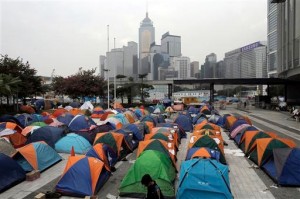
Tents set up by pro-democracy protesters are seen at an occupied area outside government headquarters in Hong Kong’s Admiralty district in Hong Kong Friday, Nov. 14, 2014. AP FILE PHOTO
WASHINGTON — The United States Wednesday gave its strongest backing yet to protesters in Hong Kong calling for “competitive” 2017 elections, but came under fire for muting its support for fear of angering China.
“The legitimacy of Hong Kong’s chief executive will be greatly enhanced if the promise of universal suffrage is fulfilled,” the top US diplomat for Asia, Daniel Russel, told US lawmakers.
“This means allowing for a competitive election in which a range of candidates with differing policy approaches are given an opportunity to seek the support of eligible Hong Kong voters,” he insisted.
The Hong Kong people should have a “meaningful choice” of candidates, the assistant secretary of state for East Asia and Pacific Affairs told the Senate Foreign Relations committee.
He was speaking as the founders of the pro-democracy movement surrendered to police in a symbolic move, seeking to take the protests off the streets after more than two months of rallies which have seen sporadic violence.
Russel also told US senators that Washington was concerned “by signs” that China’s commitment to the “One Country Two Systems” model, under which the former British territory is governed, is “eroding.”
Protesters began blocking three major Hong Kong intersections in late September to demand free leadership elections in the semi-autonomous Chinese city which was handed back to China from British rule in 1997.
But China insists that candidates for the 2017 leadership vote must be vetted by a loyalist committee, which demonstrators say will ensure the election of a pro-Beijing stooge.
It has also loudly told Washington to back off from the issue, saying it is a matter of China’s internal affairs.
US President Barack Obama during a trip to Beijing last month told a joint press conference with his Chinese counterpart Xi Jinping that Washington encouraged the Hong Kong people’s right to peaceful protests.
But rights activists urged Washington to do more to press Beijing to stick by its commitments to Hong Kong.
US urged to do more
“I see no reason why the US should not, or could not say that revising the electoral arrangements … is a requirement for cooperation in some of those other realms” with China such as counter-terrorism, said Sophie Richardson, China director for Human Rights Watch.
She hit out at the US response saying it “has been muted, it has not necessarily been deployed when it was needed most.”
Richardson recalled how during the pro-democracy protests in Kiev a year ago, top US diplomat Victoria Nuland had joined their ranks handing out bread.
“That’s a very evocative response, and gesture of support. Obviously there are different circumstances, but clearly the US is capable of very demonstrably showing its support.”
So far declarations of US support for the protestors had not “reached the people in Hong Kong who needed or wanted to hear it,” Richardson argued.
“I think the US continues to be quite inconsistent about issues of political rights and democracy in Hong Kong and China, relative to the kind of support that it chooses for those issues in other parts of the world.”
But Russel defended Washington’s role as fostering such elections, while speaking up in support of the protesters, adding that the US takes “the side of justice, we take the side of freedom.”
Senator Marco Rubio contended however that most of the US comments on Hong Kong had not been about “standing on behalf of the people who are fighting.”
He said “realpolitik” circumstances due to China’s global and regional influence were shaping the US response “because we don’t want to ruin our relationship with the Chinese.”
“That’s the message that people are taking and I think it’s a counter-productive one.”
RELATED STORIES
HK protest heads to ‘surrender’, urge students to retreat

